British holidaymakers could be paying 20 times more than the ‘fair’ price for PCR Covid tests, a top scientist has claimed.
A price in the region of £20 would be reasonable for the swabs according to Professor Stephen Bustin, a world-renowned expert on PCR at Anglia Ruskin University.
But the most expensive test listed on the Government’s website of approved providers costs £400. On average, British travellers have to fork out £92 per test.
Tourists travelling to green list countries and fully vaccinated holidaymakers going to amber list destinations are required to book one PCR test in Britain for when they reenter the country.
Non-vaccinated travellers need two after returning from amber list countries and red list destinations require two regardless of inoculation status.
Ministers insist travellers take PCR tests — which can take three days to produce results — because they are more accurate than cheaper lateral flows, which give answers in as little as 20 minutes.
Health Secretary Sajid Javid has already asked the Competition and Markets Authority watchdog to investigate potential profiteering among firms providing tests for holidaymakers. Tests can cost up to five times as much as flights, it emerged last night.
Ministers are facing increasing pressure to cap how much travellers pay for PCR tests and scrap VAT on them to stop would-be holidaymakers from being priced out of foreign breaks.
The World Travel and Tourism Council (WTTC) today urged No10 to pay for tests for double-jabbed travellers or replace the PCR requirement with cheaper lateral flow tests.
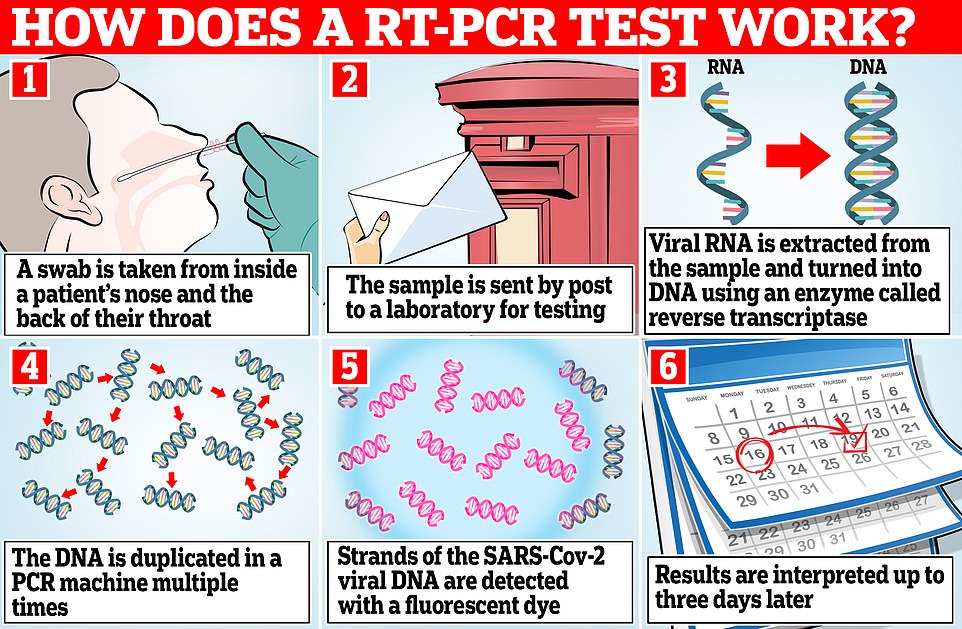
British holidaymakers could be paying 20 times more than the ‘fair’ price for PCR Covid tests required for travel abroad, it has been revealed. Graphic shows: The step-by-step process of a PCR test
Professor Bustin told The Independent: ‘A fair price, one which reflects ingredient costs and the infrastructure required, would be around about £20.’
There are dozens of options available for just £20, according to the Government’s list of 431 approved Covid PCR test providers.
But some of the companies listed are actually charging nearly five times that amount.
Test For Now claims to offer a self-swab Covid test for £21 on the Government website but the cheapest available on its website is for travelers to take on their second day back in the UK and costs £89 for a self-swab version, while it costs £97 for the same test at its clinic.
Meanwhile, Everything Genetic’s £20 offer is only available to NHS staff, with others charged £60. Pillhub-Feltham Pharmacy and 0-100 Travel 19’s £20 tests are currently sold-out and their other PCR tests cost £80.
Scientists say it is difficulty to come up with an exact figure for how much PCR testing costs because it involves complicated laboratory analysis and takes up to three days to produce results.
Professor David Livermore, a medical microbiologist at the University of East Anglia, told MailOnline: ‘Someone, somewhere has a huge mark-up on this.
‘I don’t know whether it is the company selling tests to the traveller, the lab to which that company then sends the tests for processing, or the manufacturer of the test kits used by the lab, or all of them. But someone is doing very well.’
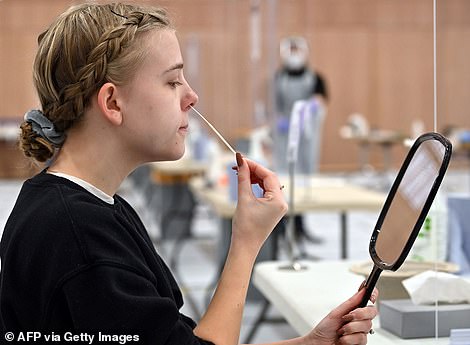
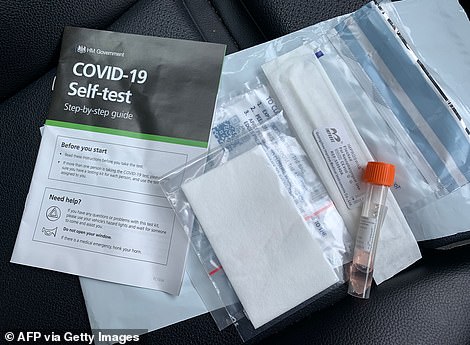
Ministers are facing increasing pressure to cap how much travellers pay for PCR tests and scrap VAT on them to stop would-be holidaymakers from being priced out of foreign breaks. The World Travel and Tourism Council (WTTC) today urged No10 to pay for tests for double-jabbed travellers or replace the PCR requirement with cheaper lateral flow tests. Pictured left, Naomi Carpenter, a sports rehabilitation student at Hull University takes a lateral flow test. Pictured right, the contents of a self-swab PCR test that is dished out by the Government
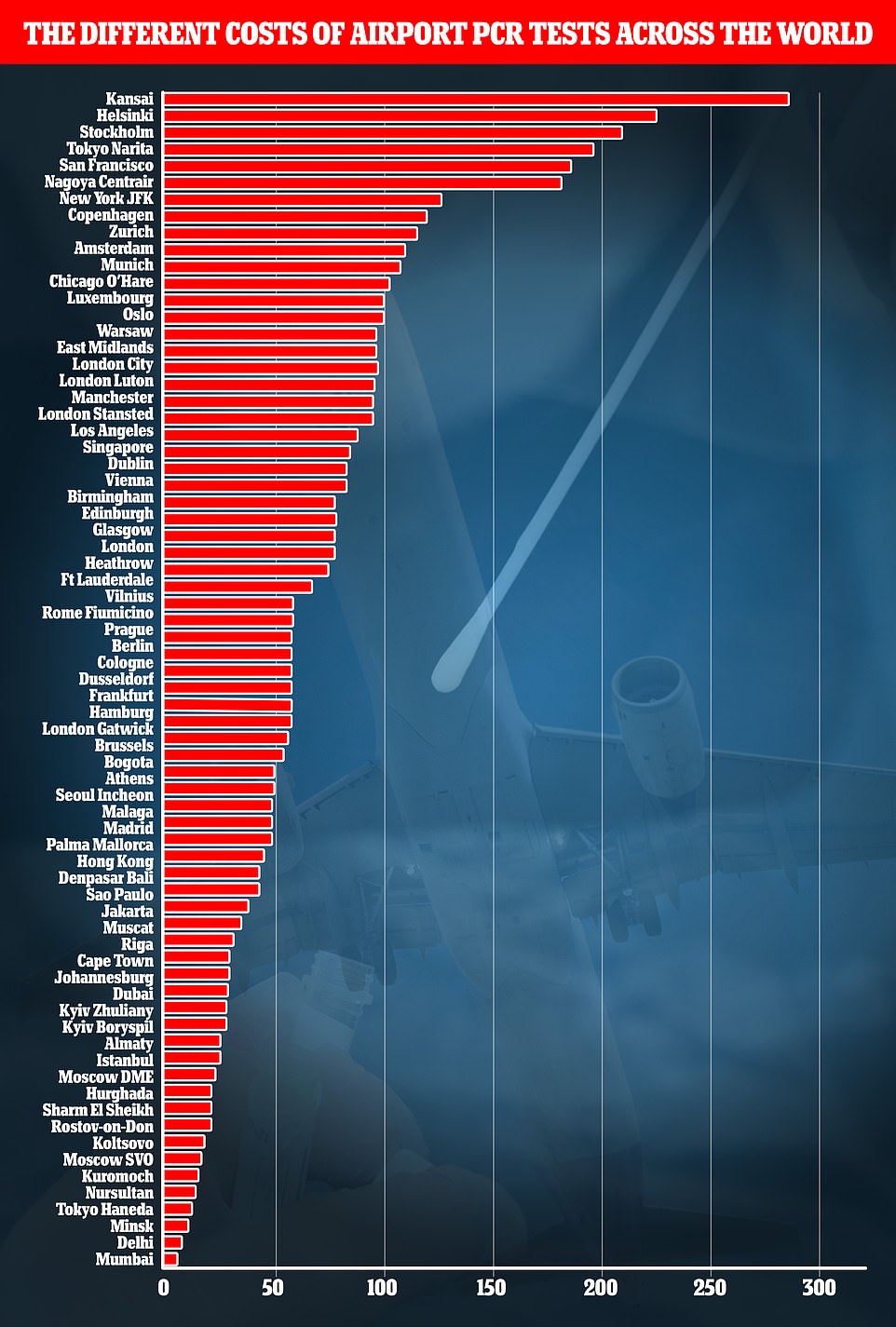
Research by airline consultancy Skytrax shows airport PCR tests were available for as little as $8 (£5.70) in Mumbai, India, in April. The cost in Britain was nearly £100
The £400 PCR test listed on the UK Government’s approved list of providers is offered by ROC Health Services, which is located just around the corner of London’s Harley Street.
But there are several factors that could be behind the sky-high price, including the fact it is based in central London.
The Department of Health also says the tests — which can be performed in a matter of minutes — are supervised by medical staff on site, meaning the firm may factor in some labour costs.
ROC Health Services uses Source BioScience’s laboratory to carry out the testing, suggesting the provider likely has to pay to get the samples analysed. Labs use a machine and array of chemicals to decipher whether a sample contains Covid.
Northern Irish testing firm with overflowing swab bins that has made millions from pandemic 
Randox Laboratories was founded by Dr Peter FitzGerald in 1982 and currently employs more than 1,500 people. Dr Fitzgerald pictured above
Randox has hoovered up commercial testing contracts during the pandemic – and is the recommended tester for airlines including British Airways.
It offers tests for as little as £40 but prefers tests are dropped at their ‘bins’ outside pharmacies rather than receiving them in the post like other companies.
Before the pandemic it made most of its cash from tests created for cardiac risk, various cancers and diabetes.
By last September Randox became responsible for a quarter of all community tests across the UK after winning a £133million contract in March 2020.
Randox Laboratories was founded by Dr Peter FitzGerald in 1982 and currently employs more than 1,500 people, with offices in Brazil, America and India among others.
Its main base is in Antrim in Northern Ireland but it has sites all over the world.
The lab employs Conservative MP Owen Paterson as a consultant for £100,000 a year which easily surpasses his salary as an MP.
Paterson has previously lobbied the government on behalf of the company. Randox has insisted its relationship with Mr Paterson had no role in it winning the multimillion contract from the government.
It has also denied prioritising commercial contracting.
Advertisement
RT-PCR tests — the same kind as used in Britain — were last week capped at 500 rupees (£4.80) in private labs and hospitals in Delhi, although there are also reasons why tests could be so cheap in India.
Officials who capped the price tests to make them more accessible for the ‘common man’ have not confirmed if they subsidised part of the price.
A Canadian study of RT-PCR tests used for the SARS outbreak in 2004 suggested the entire testing process could be done effectively for as little as £3.10 ($4.30).
Professor Livermore told MailOnline: ‘Since then molecular biology has become more efficient and costs haven’t gone up but more than inflation. Moreover, given the amount of testing, there should be major economies of scale.’
Much of the mark-up in tests appears to be made by the companies that manufacture test kits, which include swabs, test tubes and special reagents used to detect the virus inside the laboratory.
Thermo Fisher — a major manufacturer in the US — provides these kits to labs and PCR testing agents for $1,562.50 (£1,190) per 25 tests. It works out around $62.50 (£45) each — 64 per cent of the average cost for PCR testing in the UK.
Shortages in swabs and vials because of the global demand for tests may have also driven up the price of kits.
Labs or companies buying high volumes of these tests are likely to be able to drive down the price they pay.
But a listed price of around £45 per kit would represent a mark up of nearly 10 times the costs of the entire testing process — including distribution and actual laboratory testing — if they are as low as suggested by the prices in Delhi.
Labs themselves are also raking in the profits. In 2019, Quest Diagnostics and Laboratory Corporation of America made on average $42 (£30) in revenue per procedure and the average processing cost was $29 (£21). For Covid, the basic price set by US Government-backed insurer Medicare is $100 (£72).
Pandemic testing is unusually fiddly and more reliant on manpower than some other types but even with double the normal level of expense, to reflect the extra quirks and intricacies of Covid-testing, the company’s coronavirus-test margin would be one-third higher than it generates from its regular activities.
Professor Livermore told MailOnline: ‘There is little justification for the present level of pre- or post-travel testing. The only pertinent issue is whether new variants are being introduced via travellers.
‘And this could be better monitored by sampling — and sequencing — virus from any travellers who experienced a post-arrival respiratory infection.’
It comes after the WTTC said if the British Government want people to take ‘unnecessary’ PCR tests ‘they should pay for it’.
Virginia Messina, senior vice president and acting chief executive, said: ‘If they don’t pay, then consumers will vote with their feet and avoid international travel altogether, further damaging the already struggling UK Travel and Tourism sector.
‘For many people, especially families and small businesses on a budget, the crippling added cost of the unnecessary PCR tests makes the difference between being able to travel or not.
‘It’s clear that many British adults simply can’t afford to travel overseas at all if they have to pay the excessive cost of PCR tests.
‘More affordable antigen tests, with PCR tests for those who do test positive, will help keep travellers safe and make taking a trip overseas within the budget of most people.
‘But if the Government wants extra information for genomic sequencing, they should pay for it. If they don’t pay, then consumers will vote with their feet and avoid international travel altogether, further damaging the already struggling UK travel and tourism sector.’
THE RULES FOR RED, AMBER AND GREEN-LISTED COUNTRIES
RED
Before travel to England you must:
take a Covid-19 test – children aged 10 and under do not need to take this testbook a quarantine hotel package, including 2 Covid-19 testscomplete a passenger locator form
On arrival in England you must:
quarantine in a managed hotel, including two Covid-19 tests
AMBER
Before you travel to England you must:
take a Covid-19 test – you must take the test in the three days before you travel to Englandbook and pay for Covid-19 tests – to be taken after arrival in Englandcomplete a passenger locator form
You must do these things whether you are fully vaccinated or not.
On arrival in England
If you are fully vaccinated
After arrival in England, you must take a Covid-19 test on or before day two.
This applies if you’re fully vaccinated under either:
the UK vaccination programmethe UK vaccine programme overseasan approved vaccination programme in Europe or the USA – not all are recognised in England
It also applies if you are:
taking part in an approved Covid-19 vaccine trial in the UK or the USAunder 18 and resident in the UK, a UK Overseas Territory, the USA or one of the specified European countries
If you are not fully vaccinated
If you do not qualify under the fully vaccinated rules, on arrival in England you must:
quarantine at home or in the place you are staying for 10 daystake a Covid-19 test on or before day two and on or after day eight
If you are in England for less than 10 days, you need to quarantine for the time you are here. You need to book day two and day eight travel tests. You only need to take the tests if you are still in England.
GREEN
Before you travel to England you must:
take a Covid-19 test – children aged 10 and under do not need to take this testbook and pay for a day 2 Covid-19test – to be taken after arrival in Englandcomplete a passenger locator form
On arrival in England
You must take a Covid-19 test on or before day two after you arrive.
Children aged four and under do not need to take this test.
You do not need to quarantine unless the test result is positive.
You must quarantine if NHS Test & Trace informs you that you travelled to England with someone who has tested positive for Covid-19.
If you have been in a country or territory on the red or amber list
If you have also been in or through a country or territory on the red list in the 10 days before you arrive in England, you must follow the red list rules.
If you have also been in or through a country or territory on the amber list in the 10 days before you arrive in England, and have not visited a country on the red list, you must follow the amber list rules.
Source: FCDO. Used under the Open Government Licence.
Advertisement Covid tests are FIVE TIMES the cost of flights: Families are left with huge extra bills to travel abroad as it emerges screening is more expensive than return journey to Europe
Covid travel tests can cost more than five times the price of a return flight to Europe, it emerged last night.
It leaves families paying hundreds of pounds extra to go abroad this summer with MPs branding the expense ‘a rip-off’.
Ministers face increasing pressure to cap how much travellers pay for PCR tests and scrap VAT on them to stop would-be holidaymakers from being priced out of foreign breaks.
A study by MPs looked at the cost of trips to popular European destinations later this month and compared them with the average fee for a single PCR swab after getting back to Britain.
It found Ryanair was offering return flights from East Midlands airport to Barcelona and Exeter to Alicante for just £18 between August 24 and 27.
But the typical charge for a post-return PCR test among Government-approved providers is £93 – some five times as expensive. The swab is also almost four times as costly as a return flight from London Stansted to Madrid.
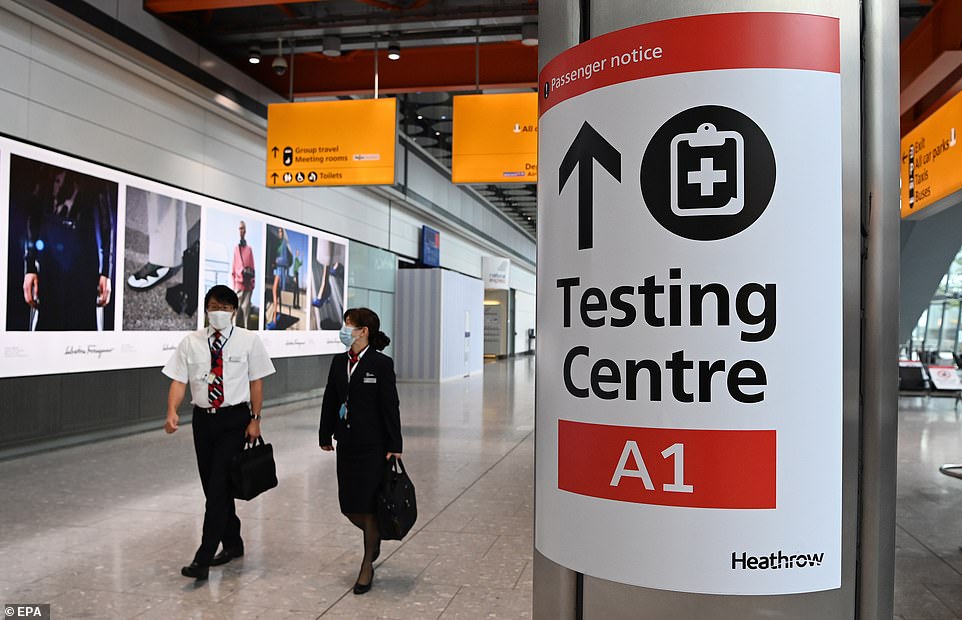
A study by MPs found Ryanair was offering return flights from East Midlands airport to Barcelona and Exeter to Alicante for just £18 between August 24 and 27. Pictured: a sign to a Covid-19 test centre at London’s Heathrow Airport on July 31
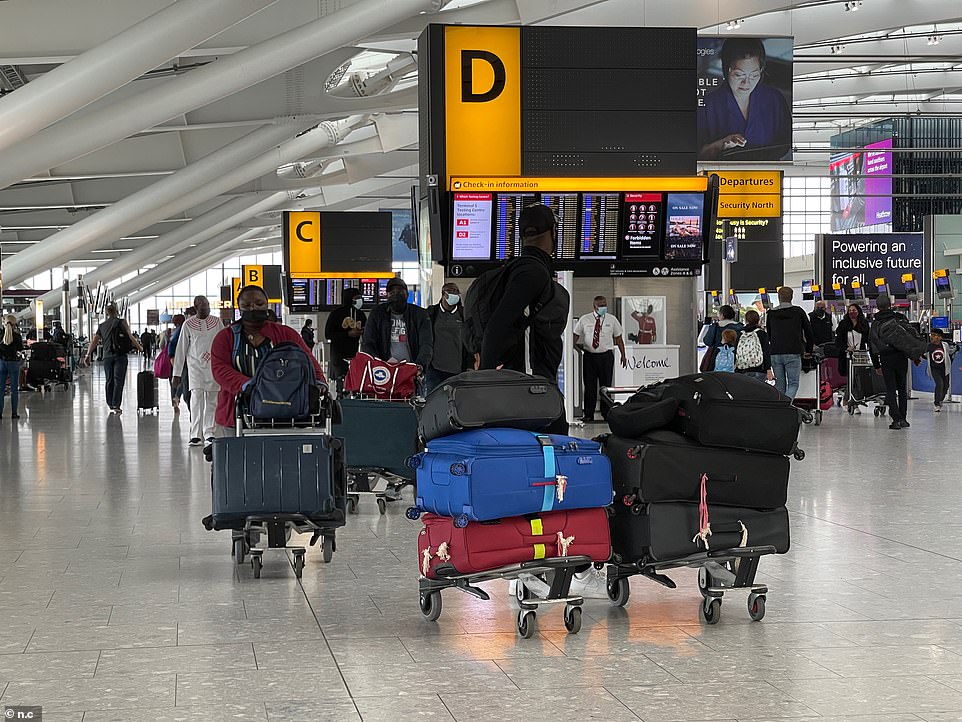
Ministers face increasing pressure to cap how much travellers pay for PCR tests and scrap VAT on them to stop would-be holidaymakers from being priced out of foreign breaks (pictured: terminal 5 departures at Heathrow Airport this month)
And for destinations such as Berlin, Budapest and Faro in the Algarve, the test is more than double the price of plane tickets.
The research only includes the cost of a single post-return PCR swab, which double-jabbed travellers must take by day two after returning from a green or amber country.
It does not include the pre-return swab all passengers must take before boarding UK-bound planes, meaning testing bills as a proportion of flight costs can be even greater. Non-fully vaccinated holidaymakers also face much larger bills as they are required to take two post-return PCR swabs on days two and eight.
The Daily Mail has championed calls for the Government to drive down costs.
Tory MP Henry Smith, chairman of the all-party Future of Aviation Group, which conducted the study, said: ‘These figures demonstrate that testing for international travel has become little more than a tax on travel, adding a huge disincentive to travel.
‘When the cost of testing can be more than the price of a ticket, it is clear that the current system is not fit for purpose and needs urgent reform to stop the rip-off fees we are currently seeing.’
He said travellers should be allowed to take much cheaper rapid lateral flow tests on return followed by a ‘gold standard’ PCR only if this is positive.
He added: ‘Alongside this, ministers must urgently consider a cap on the total cost of testing. It is high time that the Government got to grips with this issue.’ Sir Graham Brady MP, chairman of the Tory backbench 1922 Committee, said: ‘The number of tests required and their exorbitant prices in the UK risk making foreign holidays the preserve of the well off.
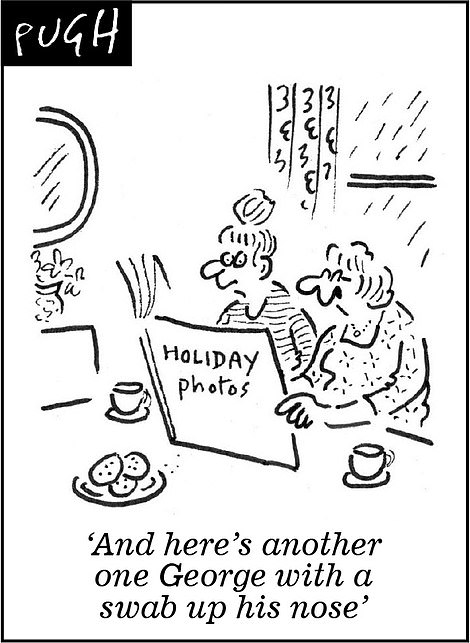
‘This is plainly unfair to families on average incomes and risks destroying our very successful travel industry. This problem should be tackled as a matter of urgency.’
The study found a post-return PCR test can also cost more than return flights to Nice in southern France, Malta, Gibraltar and the Balearic island of Menorca, doubling the cost of a trip even for fully vaccinated individuals.
Carrier easyJet is offering return flights to Mahon in Menorca for £61 later this month, making the average cost of a test nearly 50 per cent more than the flights. British Airways is offering return flights from Heathrow to Paris for £100, making the typical post-return testing bill almost as expensive as the flights.
Ministers insist arrivals must take pricier PCR tests as they are considered more accurate and can be ‘sequenced’ for mutant Covid strains. But NHS Test and Trace figures show just 5 per cent of swabs are being sequenced. Greece and Italy have capped the price of PCR tests, while in France they are free for citizens. Some European countries have also axed VAT on testing kits.
The Government has repeatedly said it is working with the travel industry and testing providers to see how to ‘further reduce the cost of travel for the public’. Health secretary Sajid Javid has asked the Competition and Markets Authority watchdog to investigate whether travellers are being ripped off by testing firms.
But Labour MP Ben Bradshaw, who sits on the Commons transport committee, said: ‘While the rest of Europe is enjoying a relatively normal summer on the beach, for many British families the cost of the tests and the confusing and chaotic traffic light system is putting the dream of a foreign holiday out of reach.’
A Government spokesman said: ‘We are clear that all private providers must meet a set of required standards and each provider is held to account by the independent United Kingdom Accreditation Service, with companies that fail to meet high standards being removed from the list of approved suppliers.’
The great travel test farce! Swab boxes left overflowing
By David Churchill and Josh White for the Daily Mail
Britain’s travel testing system was branded an ‘absolute mess’ yesterday after uncollected swabs were left piled high outside pharmacies.
Pictures posted online showed three drop-off boxes run by Randox, the UK’s largest PCR testing provider, overflowing with swabs.
It meant outraged customers were forced to choose between adding to the pile – risking their personal details being stolen by thieves – or shell out for a private courier.
Yesterday’s images have fuelled fears that the testing system will be unable to cope if too many Britons go abroad during the school holidays.
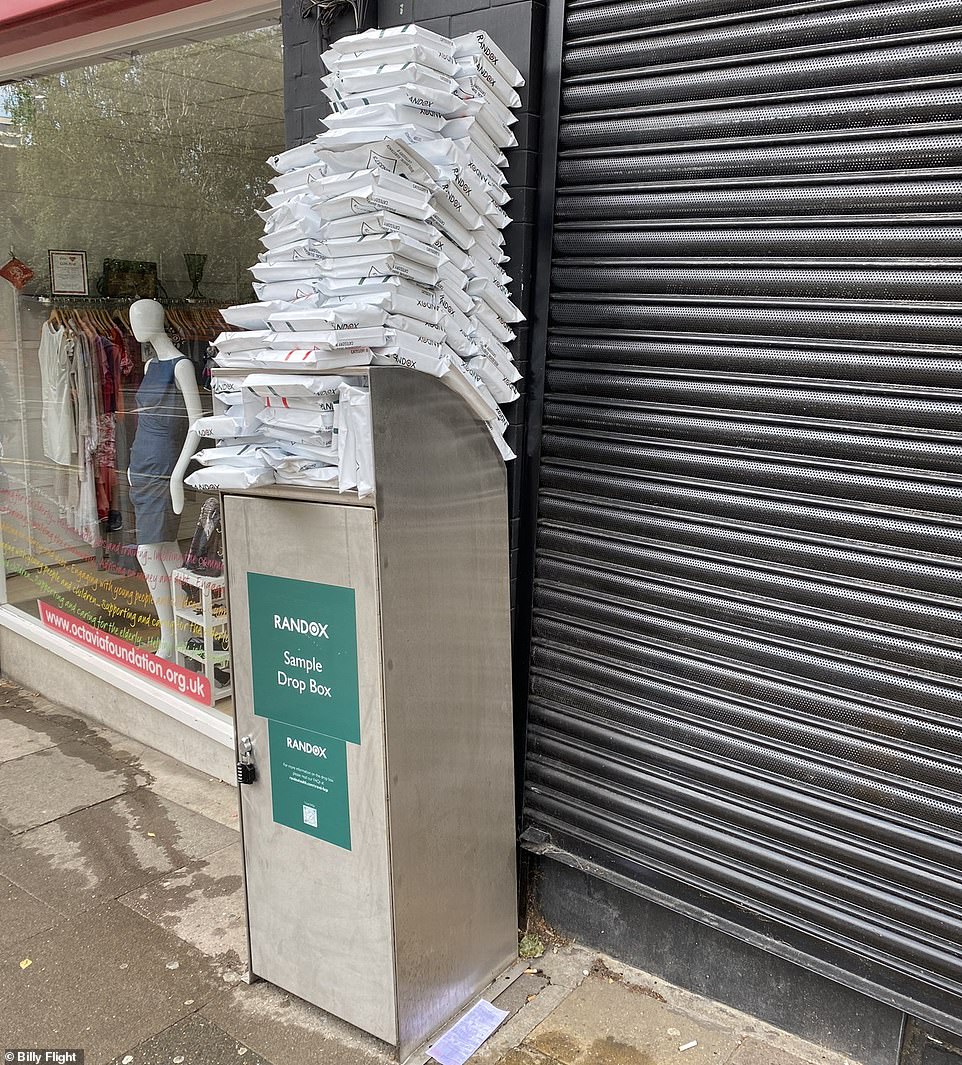
Piled high: A Randox drop-off bin in London filled with uncollected PCR tests, showing the demand in the currently privately-run holiday testing system
Ditch traffic light system, says former vaccine boss
The current traffic light system for international travel is too complicated and should be ditched, the former head of the Government’s vaccine taskforce has said.
Clive Dix said the current four categories – green, green watchlist, amber and red – should be replaced with just red and green.
He said that high levels of vaccination in the UK and other countries meant only those destinations with low jab uptake and without widespread testing should be on the red list, with quarantining required. All other countries should be green, needing only a test on return.
‘We don’t really know what the viral variants are [in those countries],’ he told the Daily Telegraph. ‘The rest, we’re pretty sure what’s there. I think there’s no difference between moving around there and us moving around within the UK.’
Advertisement
All travellers returning from green and amber list countries must take a test by day two after arriving back in the UK. Those who have not been fully-vaccinated must also take a test on day eight. Some countries also require a pre-holiday test to show on arrival.
It means that, were any of these types of tests left uncollected, potential burglars could work out when people were away and their homes empty.
Gavin Williams, 51, from Southfields in south-west London, said he travelled 30 minutes to the nearest Randox drop-off bin to deliver his daughter’s day two PCR test. But when he arrived, it was filled to the brim and overflowing.
Posting a picture to Twitter, the teaching assistant, who paid £43 for the tests, said he felt ‘ripped off’.
Replying with a picture of another drop-off bin with uncollected tests piled 20 boxes high, Tilly Slight posted: ‘You think that one’s bad?’
The pictures have sparked fury among travel experts, with Paul Charles, CEO of consultancy The PC Agency, saying they were ‘a symbol of the absolute mess that PCR testing has become’.
And Rory Boland, editor of Which? Travel, said the watchdog had repeatedly warned the testing system would be unable to cope with too many people travelling abroad.
‘It’s particularly frustrating as Which? raised this with the Government a few months ago,’ he said. ‘The system isn’t set up for large numbers of people travelling. Now many people are travelling, the system is not working properly.’
Randox is among more than 400 private testing firms on the Government-approved list of providers.
According to the Government’s website, the firm charges £43 for a ‘self swab at home’ day two test. The cost for a days two and eight package is £86.
The latest controversy comes a year after Randox sent out hundreds of thousands of unsterile tests to care homes.
As a result, it was forced to recall 750,000 unused kits.
Despite this, the company was awarded a new £347million Government contract and is capable of processing around 500,000 swabs a day.
A spokesman for Randox said the firm was increasing the number of drop boxes across the UK as well as the frequency of test collections.
‘All of the sample kits pictured will be processed,’ the spokesman added.
Source link : https://www.dailymail.co.uk/news/article-9879367/Covid-testing-providers-making-6-500-profit-PCR-swabs.html











